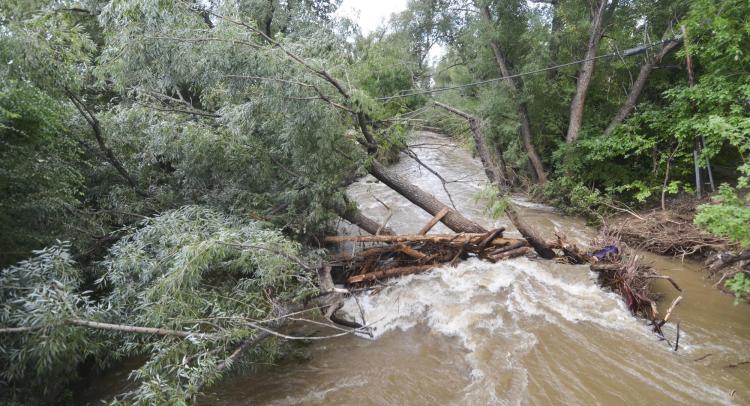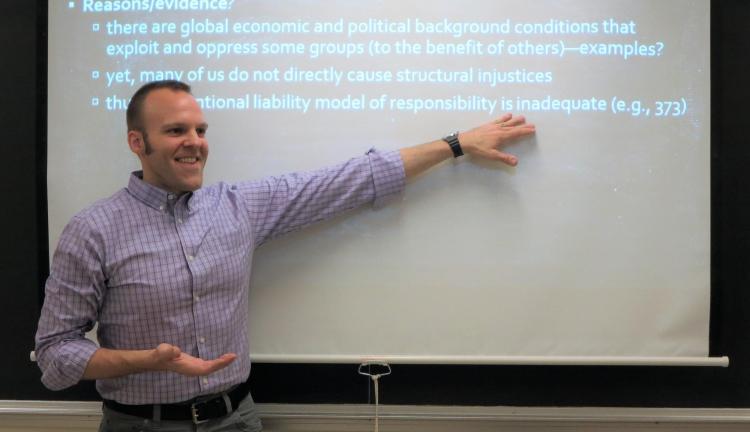Students work to prepare Boulder County for next environmental disaster

Floodwaters during the 2013 Boulder flood. (Credit: CU Boulder)
While students across the country are putting finishing touches on essays and cramming for final exams, one CU Boulder class is preparing to address a test that is hopefully further off: Boulder’s next environmental disaster.
Students from Lev Szentkirályi’s Climate Change, Environmental Health, and Resilience course spent the semester conducting on-campus interviews and researching environmental disaster resilience. Students looked for ways to connect university resources with the surrounding community and prepare CU Boulder international students for the next major flood, wildfire or other disaster.
On Monday, the students took turns presenting their findings to the Boulder Community Resilience Council—a partnership between Foothills United Way (FHUW) and local city and county stakeholders and community leaders.
“Knowing that the effects of an environmental disaster are going to be diverse and broad, how can we make sure that the university is a key player in these conversations?” asked Szentkirályi, a teaching faculty member in the Program for Writing and Rhetoric.
Szentkirályi developed the project in partnership with Boulder County to answer that question. The class, mostly STEM students, worked in tandem with FHUW staff this semester to produce consulting reports with real-world impact.
“In teaching a class like this, my aim is to try to draw on the students’ own understanding and their own expertise of the research that’s done in their fields and get them to start putting to words what writing in their respective fields looks like,” said Szentkirályi.
A team effort

Lev Szentkirályi teaching class.
Half the class worked with Guillermo Estrada-Rivera, FHUW cross cultural network designer, to identify the unique risks faced by international students and examine campus programs positioned to safeguard them. Students researched peer institutions and pored through academic papers, but their main takeaways were gathered through face-to-face interviews with international students on campus.
“The aim is to try to understand what their perception of the risks might be to better understand how they would go about responding in times of crisis,” said Szentkirályi. “And then looking at whether or not they know what services are available.”
Student-written consulting reports for this project will inform future FHUW strategy for building community resilience, particularly among at-risk groups.
“This collaboration with CU allows us to work on building cross-sector partnerships, increasing community strength, safety, and capacity, and strengthening cross cultural knowledge and relationships,” said Estrada-Rivera. “The students interviewing international residents on the CU campus gained greater cultural competency and expanded our understanding of information availability and use in diverse audiences.”
The rest of the class split into two teams under the guidance of FHUW Community Impact Program Manager Tiernan Doyle. The groups worked to construct networks of CU Boulder faculty and administrators, respectively, to serve as environmental disaster resources for the broader community.
“The aim was to have students identify those particular individuals and offices at CU Boulder that Boulder County, the city of Boulder, FHUW and other local stakeholders could bring into the fold in thinking about resilience at the broader level,” said Szentkirályi.
Real-world impact
Szentkirályi’s students may be done with their semester-long project, but their work will live on as tangible guidance for FHUW.
“These consulting reports will help us to better understand the narrative and perception of students around disaster preparedness,” said Doyle. “We want to explore ways in which we can partner with CU to strengthen their approach to their student population and create more resilience within the region as a whole.”
Szentkirályi, who has taught similar service-learning courses in the past, sees value in asking students to engage with their communities and write for non-academic audiences. He aims to continue working with FHUW and other community organizations in future classes.
“The hope is to continue creating long-term community partnerships, where we can just plug in these classes, give campus and community partners some deliverable that helps them in some way, and give students a really unique opportunity to engage in this type of professional writing.”


